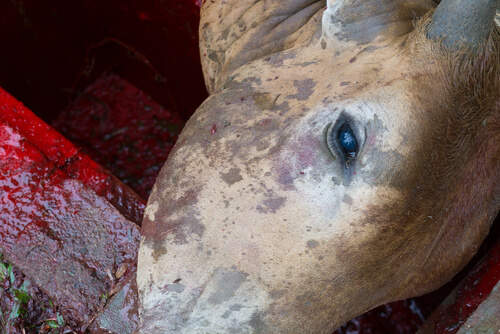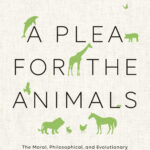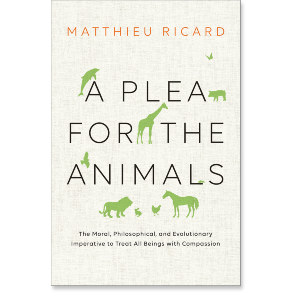
I am an unreconstructed omnivore. I shun food trips and diets. My guide to right eating is the Buddha, whose policy was to eat whatever was put in his begging bowl. Therefore, even though I had translated works of Matthieu Ricard's before, I was not a natural for translating his A Plea for the Animals. I knew it leaned toward vegetarianism, and I feared it would entangle me in unwanted idealisms as well as cast a bad light on my dinner. But trusting my author, I jumped in anyhow and began to experience the book up close and personal on a level of intensity that perhaps only a translator may reach.
Indeed Ricard's book does counsel vegetarianism to the willing, and it does end up encouraging an array of what some might regard as idealistic outlooks. But I found that what it presented first and foremost was the facts. Primarily neither ideas nor anecdotes, neither morals nor homilies, hardly any Buddhism, but rather heaps and mountains of documented, hard data. I had to be sure my word processor was doing footnotes properly-there were lots of them.
What I found I was carrying bit by bit from French into English was the story of the gruesome continuous, vast-scale extermination of animals brought on by us humans eating them. I also learned about intubated bears permanently immobilized in tiny cages in China, kept miserably alive as long as possible to be milked of their bile. I translated eye-witness accounts from slaughterhouses, industrial fishing vessels, animal-experimentation labs, zoos and circuses and bullrings, all of which routinely function on the basis of brutal disregard for the life and suffering of animals. It was horror piled upon horror. Ricard was very thorough in compiling the factual basis of his plea for the animals. I realized soon enough that this Buddhist monk had beheld with a 360-degree lens the many faces of the human exploitation of animals that has been taking place for thousands of years, and he had seen it getting worse and worse. I realized that, rather than just a pep talk for vegetarianism, I had in my hands a work of compassion for all the sentient species with whom we share life, a plea to end or at least pare down all the ways in which we customarily abuse and torture animals for entertainment, sport, and profit, not leaving out the inevitable call to end or at least pare down the human practice of killing them daily in inconceivably huge numbers for food.
As I translated Ricard's unsparing presentation of the 365-day-per-year, 24-hour-per-day Calvary of the animals, for the first time in my life I felt a flash of really caring for them all. I also began to feel sick inside. Obviously, it should have been easy for me all along to recognize the horror that is in progress. But I exercise ignorance. The people in the neighborhoods of Auschwitz and other extermination camps during World War Two, Ricard tells us (while assuring us that he is not equating the value of animals with that of humans), more or less pretended not to know what was going on inside the walls and fences they lived next to. Similarly, I, and I expect many of us, are willing to toss into a deep dark hole all the troubling data that has come our way from many exposés about slaughterhouses, industrial fishing operations, the fur industry, and so on.
I find it awkward and embarrassing. It troubles the conscience. It roils the pit of the stomach, and partly in self-defense, it sets one thinking. Naturally I want to find a thought that will salve my conscience but save my supper. Still translating away, I found myself conveying the many ideologies to this purpose that people have produced from ancient times until the present. Speciesism (on the analogy of raceism) is the strategy that covers most of them. Speciesism deliberately or inadvertently assumes that humans have been set apart from the rest of creation as a higher order, and naturally it is our privilege to use the rest of creation as we see fit for our benefit. (This approach is handy for ravaging the environment as well as its nonhuman inhabitants.) Speciesism, in some of its many forms, is at home in religion. Genesis, the first book of the Bible, which sets Adam above the animals, provides a prime example. The automatism of Descartes was a form of speciesism. The influential and revered French philosopher proclaimed that all living beings apart from humans lack a soul, and though animals may appear to manifest pain, being soulless they are mere automatons whose mechanical reflexes may only mimic agony-in reality, they feel nothing. This mechanistic vision of all nonhuman life made it just fine for scientists and others from the seventeenth century on to practice vivisection. With Matthieu, I had visited the extended horrors of the animal experimentation chambers and was deeply disturbed. Exaltation of human benefit above the rest of everything did not relieve me.
Pangs of conscience similar to mine, apart from motivating rationales that justify animal exploitation, also (much more straightforwardly) bring about rejection of it. Human voices have been begging mercy for the animals since the beginning of the human-animal relationship. Translating on, I gathered that those voices are getting louder. Nowadays we have what is called the animal-rights movement and people who have found their calling in life as "animal advocates." Matthieu Ricard describes the development of all this in historical and philosophical detail. In the end the great argument is simply compassion for suffering. Compassion for suffering is something that is profoundly difficult to limit by species.
Living vividly and in detail, as a translator does, all the data and thought supplied by his source, I experienced the stark conflicts and dilemmas of the case. My overall impression? The world is a very complex and bloody and lethal place. Sentience and suffering cohabit in it. It contains a lot of arbitrary cruelty. Compassion's job is inexhaustible. Matthieu Ricard has done a piece of it. Through his devoted, intelligent, and very thorough effort, my compassion has been a little further awakened.
-Sherab Chödzin Kohn


